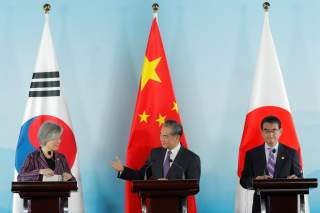South Korea and Japan Have More in Common Than They Think (Like the China Challenge)
Seoul and Tokyo shouldn’t lose sight of their similarities or the importance of countering China’s growing influence and aggressiveness in the region.
Confronting Common Security Challenges
The trade dispute between Japan and South Korea also has implications for regional security.
North Korea’s Kim Jong-un appears committed to advancing his military capabilities, eroding the sanctions regime, and weakening the U.S. alliance relationships with South Korea and Japan. The North’s actions in recent months—brazenly conducting multiple missile and weapons tests, showing off a potentially nuclear-capable submarine, hurling invective at Moon and Abe, and refusing to engage in nuclear negotiations with Washington—are obvious and urgent reminders for Seoul and Tokyo get along. Letting the current trade row get in the way of progress on North Korea, which gladly exploits such fissures in regional ties, presents a real security risk to Japan, South Korea, and to the stability of the East Asian region.
Finally, Japan and South Korea shouldn’t lose sight of countering China’s growing influence and aggressiveness in the region. They don’t have to look too far back in history to see examples of Beijing’s willingness to use its clout to punish its neighbors. In 2017, Beijing targeted a range of South Korean industries to punish Seoul’s decision to deploy a U.S. missile defense system; the South’s tourism industry alone suffered a loss of nearly $8 billion. But when Russian and Chinese bombers last month flew over the disputed islets that Tokyo calls Takeshima and Seoul calls Dokdo, Japan and South Korea squabbled over who had the right to issue warnings to the intruders, rather than persuasively countering the provocative move. Seoul’s jettisoning of the intelligence-sharing agreement this week has weakened the security relationship shared by the two countries. Chinese leaders have made it clear that they are willing to use coercion to drive a wedge between Washington and its allies in East Asia—to the detriment of the economic and security environment for Seoul and Tokyo—and it would behoove Moon and Abe to separate problems of the past from the challenges of the present.
The tension surrounding the past is unlikely to go away anytime soon. Additionally, it will be difficult for either country to recover from the trust they lost due to their recent actions. And even if Moon and Abe temporarily reconcile, grievances and underlying tensions undoubtedly will resurface. But to mitigate the impact of these all-too-frequent flare-ups, so easily manipulated by opportunistic politicians, both countries must focus on their shared interests, challenges, and values. They must enable problem-solvers at the local, national, governmental and nongovernmental levels. This would go a long way toward building an infrastructure—and attendant habits—of cooperation.
Jung H. Pak is a senior fellow and the SK-Korea Foundation Chair in Korea Studies at The Brookings Institution. Ethan Jewell is a student at The University of Texas at Austin.
Image: Reuters

